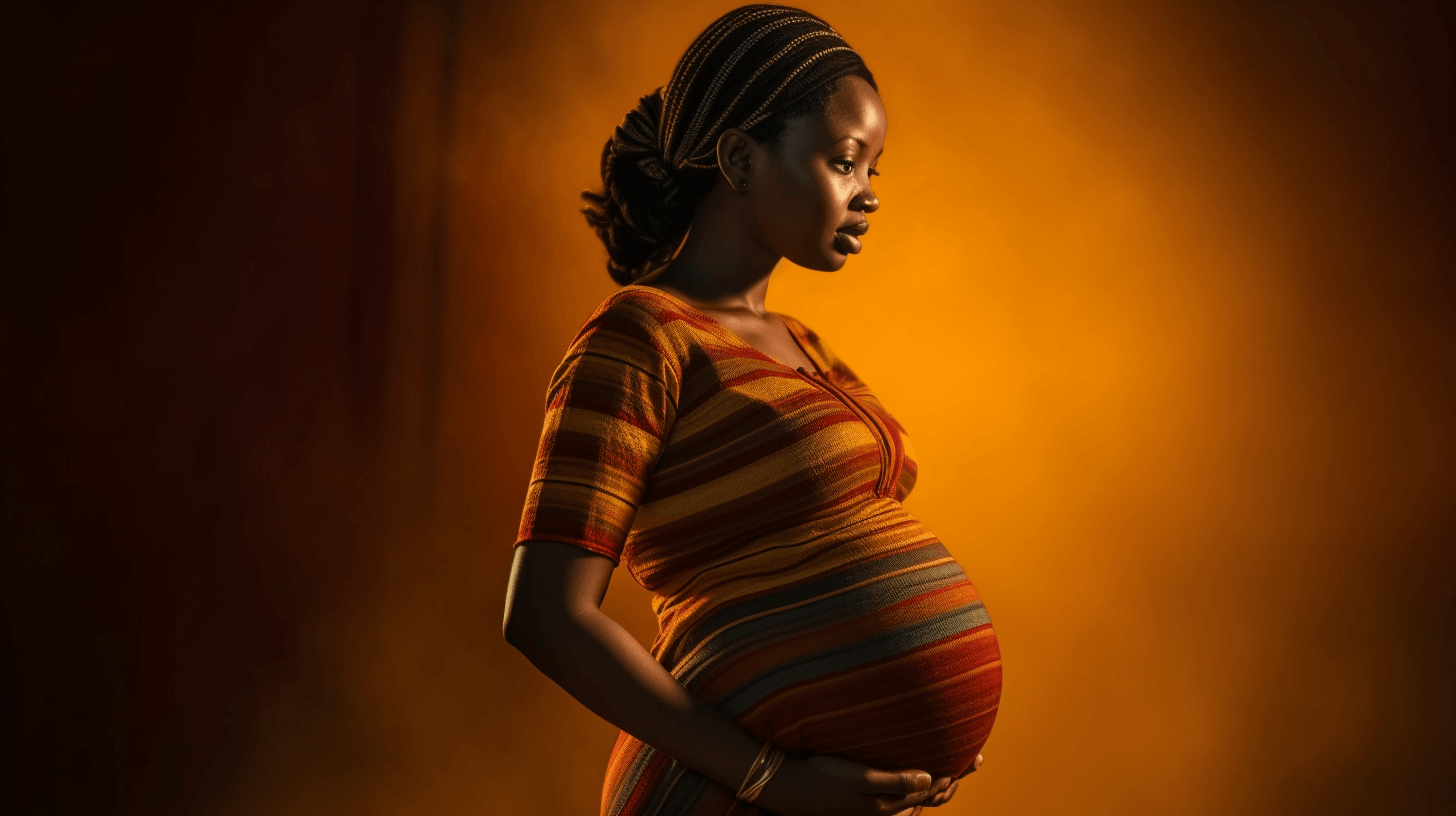🚑🏥 Choose Da Kine Death: Pau Hana On Top Da Floor o’ Out Dea Streets?” – Birthin’ Tings Get Real Shmall Kine Buggah During War Time in Sudan 🔥🤰
Sudan, da African nation up top right side, stay get plenny beef, make da wahine who get baby inside demself drive “go li’dat through da meanest tings” fo’ reach da few hospitals an’ clinics still open. O’ dey gotta look fo’ da kine midwives, who stay pile up with work, fo’ birth dea babies at home.🏠👩⚕️🚗
Not long aftah da fighting wen’ start in Sudan, Amna Al-Ahmad, one midwife who get 42 years, get one urgent call from one wahine get baby. She tell Amna she stay get ready fo’ say aloha.📞🤱💔
Amna, she run through da gun fire dat take ovah her ‘hood in Omdurman, jus’ north side of da capital, Khartoum, fo’ get da wahine house. She get dea round midnight, an’ she see quick kine da baby stay stuck inside da maddah. But no mo’ ambulance o’ taxi fo’ take dem go hospital.🌃🔫👶
“We stay make da hard decision: pau hana on top da floor o’ out dea in da streets,” she say wen’ she wen’ talk on top da phone, an’ she remember how da sounds of da guns stay mix with da wahine pain. “She tell me da pain wen’ make her spirit leave her body.”😢💥🚷
Aftah plenny hours, Amna help da wahine get on top one motorcycle an’ dey haul to one clinic close by, where da wahine can birth her girl.🏍️💨🏥👧
Da war dat stay happening in Sudan make da wahine wit’ baby inside demself go dodging da artillery an’ go through da security fo’ get to da less an’ less hospitals an’ maternity wards dat stay open. United Nations tink tens of tousands mo’, stay displaced o’ stay stuck at home, dea babies birthed by midwives o’ family members o’ nobody at all.🔫🏥👨👩👦👦
Dis beef, stay going two months now, get da Sudanese Army, led by Gen. Abdel Fattah al-Burhan, against da paramilitary Rapid Support Forces led by Lt. Gen. Mohamed Hamdan. On Saturday, da two sides agree to one seven-day cease-fire dat wen’ start on Monday night, but still get gun fire an’ ‘splosions here an’ dea in parts of da capital an’ cities close by on Tuesday.🕊️🔥⏱️
Docs an’ da kine people who help say da situation in Sudan, one of da biggest countries in Africa, stay goin’ fast kine towards one disaster fo’ da people. Sudan already had one of da highest maddah death rates befo’ da fighting wen’ start.👩⚕️🌍🚨
Mo’ den 1.1 million Sudanese wahine stay believed to be get baby inside demself. Of those who need help fo’ real, mo’ den 29,000 stay expected to birth in da next month, according to da United Nations Population Fund. At least 4,300 stay believed fo’ be at risk of death an’ need da kine emergency obstetric care, including C-sections.🤰🆘👶
“Da faddahs an’ maddahs, dey stay driving through da meanest tings fo’ get us — like dey stay on suicide missions,” say Dr. Mohamed Fath Alrahman, 33, one pediatrician an’ general manager of Al-Nada hospital in Omdurman, who stay watching da maternity ward. Dis hospital, one of da few still birthin’ babies in greater Khartoum, stay filled up wit’ pregnant wahine.🚗💨👶👩⚕️
“Cars pull up to our hospital stay all shot up,” he say wen’ he wen’ talk on da phone. “Dese wahine stay worried, stressed, an’ plenny stay already close fo’ birth dea baby.”🚗🔫🤱
He say he just let go one wahine who get breech birth aftah she stay long time at one security checkpoint, wea da paramilitary forces stay questioning her husband. “She neva get to us in time an’ da baby neva make ‘um,” Dr. Fath add.🕰️💔👶
Da number of babies born befo’ time in his hospital wen’ up almost one third since da fighting wen’ start on April 15, he say. Wit’ small kine staff, he tink his ward wen’ birth mo’ den 600 new babies in da last month — 20 times da usual number. In da first few weeks of da beef, dey stay do as much as 50 cesarean sections one day, often wit’ two new babies sharing one incubator.📆⏰👶
Mr. Fath say he stay able fo’ keep da hospital going through money from da Sudanese American Physicians Association. Da group had pay for every C-section since da start of da beef an’ make Dr. Fath can pay his staff mo’ money fo’ keep dem from running away.💰🏥💪
His story stay confirmed by aid workers from U.N.F.P.A., CARE, International Medical Corps, Doctors Without Borders an’ Save the Children, who tell The New York Times dat da crisis wit’ pregnant wahine stay show how da public health system throughout Sudan stay falling apart since da fighting start.🗞️🌍🏨
“Only going get worse,” say Adive Joseph Ege Seriki, da global adviser fo’ sexual health an’ reproductive health at International Medical Corps, which stay working to train health care workers across Sudan.📉👩⚕️🌍
Da bad maternal health situation also stay affecting da babies born befo’ time. “Babies born befo’ time stay at high risk fo’ get lifelong problems,” he say, including problems wit’ learning, cerebral palsy, an’ hearing an’ seeing problems.👶🚼🚑
Even befo’ dis current beef, Sudan had one fragile health system with not enough infrastructure an’ equipment, no mo’ plenny skilled health professionals an’ not enough supply chain. According to da U.N., Sudan’s maternal mortality rate stay about 270 deaths per 100,000 live births, compared to 21 per 100,000 in the United States.🏥💔📊
In Khartoum state, which get about 10 million people, about 60 percent of health care facilities stay now closed, with only 20 percent fully working, according to the U.N. In El Geneina, da capital of West Darfur region, all health facilities stay closed. Hospitals demself stay scenes of intense fighting. Armed groups kick out eight patients who stay getting care at a health center in Khartoum fo’ use it as a base, da nonprofit Save the Children say. Plenty doctors and nurses who stay in da country stay getting threats an’ arrested.🔒🏥🔫
Looting stay all ova da place; plenty hospitals, pharmacies an’ warehouses stay getting ripped off. Patients wit’ long-time diseases like cancer, heart disease or diabetes stay no can get medication for weeks, while plenty dialysis centers stay closed, da Sudanese doctors’ union say.💔🏥👩⚕️
But few parts of Sudan’s health system stay affected as bad as its maternal care networks. Right wen’ da fighting start, midwives all ova da country start getting pleas fo’ help from expecting maddahs.🤰🚨👩⚕️
“Dese wahine stay becoming one important lifeline for those who stay stuck at home,” say U.N.F.P.A.’s reproductive health team leader in Sudan, Rania Hassan, who stay helping support a network of at least 400 community midwives in da country. Dey work stay really important in da region in and around Khartoum, wea fighting stay da worst, and wea plenty wahine like fo’ give birth in health care facilities, she say.👩⚕️🏥🌍
Midwives stay going all ova da cities an’ villages an’ going into wahine’s homes fo’ birth newborns, often replying to requests from neighborhood chat groups or emergency hotlines.🏠👶📞
Ms. Ahmad, who ride with da pregnant wahine on da motorcycle, stay helping run a team of 20 midwives in Omdurman. Togetha, dey stay helped birth about 200 babies — up from five or six in one normal month — since da fighting start.🏍️👶🎉
Da midwives no only stay facing violence, she say, but dey often stay having to work without phones or internet, which stay getting messed up by da fighting.📵💥📞
Ms. Ahmad say she stay birthed eight babies during da conflict, but da chaos stay making it more hard fo’ reach wahine and get medical supplies.👶📦🔫
Her story stay repeated by others, like Ahlam Abdullah Hamid, one 27-year-old midwife who stay birthed six babies in da city of Bahri, just north of Khartoum.👶👩⚕️🌆
“Da situation stay so hard,” she say wen’ she wen’ talk on da phone, adding dat she stay moved to help aftah scrolling through a flurry of requests from pregnant wahine posted on her neighborhood WhatsApp channel.📱🤰🆘
While all her births stay successful, she say she stay getting worried about getting through da worsening and unpredictable street fighting at night, which is wen’ she typically stay answering calls.🌃🔫📞
But she stay still willing to take da risk, she say, adding that she feel a strong sense of responsibility to help every time she hear from one wahine who get baby. She say she just like fo’ make every wahine get da best care possible, no matter da situation.👶👩⚕️💖
NOW IN ENGLISH
🌍🔥👶 Choose Your Death: On Da Floor or In Da Streets” – Childbirth Struggles Amid Sudan’s War
In northeast Africa, Sudan’s war has pushed expectant mothers to the edge, driving “through hell”🔥 to get to the quickly shrinking number of hospitals and clinics, or relying on overwhelmed midwives for home births.🏥🚗🤰
Just days after the conflict broke out in Sudan, Amna Al-Ahmad, a 42-year-old midwife, received a frantic call from a pregnant woman who believed she was going to die. Al-Ahmad braved the gunfire tearing through her neighborhood in Omdurman, just north of the capital, Khartoum, and rushed to the woman’s home.📞🔫🏃♀️
Arriving at midnight, Al-Ahmad quickly realized that the baby was trapped in the mother’s birth canal, and there were no ambulances or taxis to transport them to a hospital. They were faced with a chilling decision: risk dying at home or in the violence-riddled streets.🚫🚑🏥🌃
The woman’s pain was so intense, she described it as her soul being forced from her body. Finally, after several hours, Al-Ahmad helped the woman onto a motorcycle and they rushed to a nearby clinic where the woman was able to deliver her daughter.🏍️🤱🏾💨
The ongoing war in Sudan has forced pregnant women across the country to dodge bullets and navigate through military checkpoints to reach the diminishing number of hospitals and maternity wards still in operation. The United Nations estimates tens of thousands have been displaced or are trapped at home, their babies delivered by midwives, family members, or in some cases, no one at all.🤰🔫🏥🌍
The conflict, now in its second month, is causing strife between the Sudanese Army, led by Gen. Abdel Fattah al-Burhan and the paramilitary Rapid Support Forces led by Lt. Gen. Mohamed Hamdan. They agreed to a seven-day ceasefire starting Monday night, but sporadic gunfire and explosions could still be heard in parts of the capital and surrounding cities on Tuesday.🔫💥⏱️
Healthcare workers and aid providers are warning that Sudan, one of Africa’s largest nations, is on the verge of a humanitarian catastrophe. Before the fighting, Sudan already had one of the world’s highest maternal mortality rates.🏥🌍📢
Over 1.1 million Sudanese women are believed to be pregnant. Of those who desperately need humanitarian aid, more than 29,000 are expected to give birth in the next month, according to the United Nations Population Fund. At least 4,300 are believed to be at risk of death and require emergency obstetric care, including C-sections.🤰🆘🌐
In the words of Dr. Mohamed Fath Alrahman, a 33-year-old pediatrician and general manager of Al-Nada hospital in Omdurman, “Parents have been driving through hell to reach us — it’s like they’re on suicide missions.” His hospital, one of the few left in the greater Khartoum area still delivering babies, is being overwhelmed by pregnant women.🏥🚗🤰
Cars riddled with bullet holes pull up to their hospital. Inside, anxious and stressed women in advanced stages of labor. He recalls a woman who arrived with a breech birth after spending hours at a checkpoint controlled by the paramilitary forces. She didn’t reach the hospital in time, and the baby didn’t survive.💔👶🚗🔫
The number of premature births in his hospital has jumped by almost a third since the fighting began on April 15. Despite running on a skeleton staff, he estimates his ward has delivered more than 600 newborns in the past month — 20 times the normal rate. They were performing as many as 50 C-sections a day, often with two newborns sharing an incubator.👶👶🏥📈
Dr. Fath managed to keep the hospital operational thanks to international funding from the Sudanese American Physicians Association. The organization has financed every C-section since the conflict began and allowed Dr. Fath to offer his remaining staff higher wages to prevent them from leaving.💰💉🌐
Aid workers from U.N.F.P.A., CARE, International Medical Corps, Doctors Without Borders, and Save the Children confirmed Dr. Fath’s account. They told The New York Times that the crisis affecting pregnant women is a telltale sign of the collapse of Sudan’s public health system since the fighting started.🗞️🏥🌍
Adive Joseph Ege Seriki, the global adviser for sexual health and reproductive health at International Medical Corps, warned, “This is only going to get worse.” The precarious maternal health situation also carries lifelong risks for babies born prematurely, including intellectual disabilities, cerebral palsy, and hearing and visual impairments.👶🚨💔
Even before the current conflict, Sudan’s health system was fragile with inadequate infrastructure, equipment, a lack of skilled health professionals, and a limited supply chain. In Khartoum state, which is home to about 10 million people, about 60 percent of healthcare facilities are now closed, with only 20 percent fully operational, according to the U.N.🏥⚠️🔒
Hospitals have become battlegrounds. Armed groups kicked out patients from a healthcare center in Khartoum to use it as a base. Many doctors and nurses remaining in the country have been threatened and arrested. In addition, many hospitals, pharmacies, and warehouses have been looted. Patients with chronic diseases like cancer, heart disease, or diabetes have been unable to get medication for weeks, while dozens of dialysis centers have closed, the Sudanese doctors’ union said.🏥🔫💊
However, few areas of Sudan’s health system have been hit as hard as its maternal care networks. As soon as the fighting began, midwives across the country started receiving calls for help from expectant mothers.🤰📞
Rania Hassan, U.N.F.P.A.’s reproductive health team leader in Sudan, said, “These women have become an increasingly vital lifeline for those who are stuck at home.” Their work is especially critical in the region in and around Khartoum, where the fighting has been most intense.💪👩⚕️🤱🏾
Midwives have been traveling across cities and villages, entering women’s homes to deliver newborns. Ms. Ahmad, who helped the pregnant woman on the motorcycle, has coordinated a team of 20 midwives in Omdurman. They’ve delivered about 200 babies — up from the usual five or six in a month — since the fighting began.👩⚕️👶🚗
These brave midwives, often operating without phones or internet due to the clashes, are determined to provide their services amidst the chaos, even though it has become increasingly difficult to reach pregnant women. They stand as the last line of defense for expectant mothers in this turbulent period.✊📵👩⚕️🤱🏾







